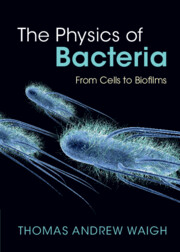Book contents
- The Physics of Bacteria
- The Physics of Bacteria
- Copyright page
- Dedication
- Contents
- Preface
- Acknowledgements
- Part I Physical Tools
- 1 How to Track Cells and Molecules
- 2 Statistics of Bacterial Motility
- 3 The Electrochemical Potential of a Cell
- 4 Mesoscopic Forces and Adhesion
- 5 Reaction–diffusion Equations
- 6 Polymer Structure and Dynamics
- 7 Colloidal Structure and Dynamics
- 8 Liquid Crystals
- 9 Low Reynolds Number Hydrodynamics
- 10 Viscoelasticity
- 11 Systems Biology
- 12 Non-linear Dynamics
- 13 Experimental Characterisation Techniques
- 14 Machine Learning
- Part II Single Bacteria
- Part III Interacting Bacteria and Biofilms
- Index
- References
9 - Low Reynolds Number Hydrodynamics
from Part I - Physical Tools
Published online by Cambridge University Press: 12 December 2024
- The Physics of Bacteria
- The Physics of Bacteria
- Copyright page
- Dedication
- Contents
- Preface
- Acknowledgements
- Part I Physical Tools
- 1 How to Track Cells and Molecules
- 2 Statistics of Bacterial Motility
- 3 The Electrochemical Potential of a Cell
- 4 Mesoscopic Forces and Adhesion
- 5 Reaction–diffusion Equations
- 6 Polymer Structure and Dynamics
- 7 Colloidal Structure and Dynamics
- 8 Liquid Crystals
- 9 Low Reynolds Number Hydrodynamics
- 10 Viscoelasticity
- 11 Systems Biology
- 12 Non-linear Dynamics
- 13 Experimental Characterisation Techniques
- 14 Machine Learning
- Part II Single Bacteria
- Part III Interacting Bacteria and Biofilms
- Index
- References
Summary
Introduces the Navier–Stokes equation, Reynolds number, Stokes equation, filament hydrodynamics and dipoles.
Information
- Type
- Chapter
- Information
- The Physics of BacteriaFrom Cells to Biofilms, pp. 84 - 88Publisher: Cambridge University PressPrint publication year: 2024
